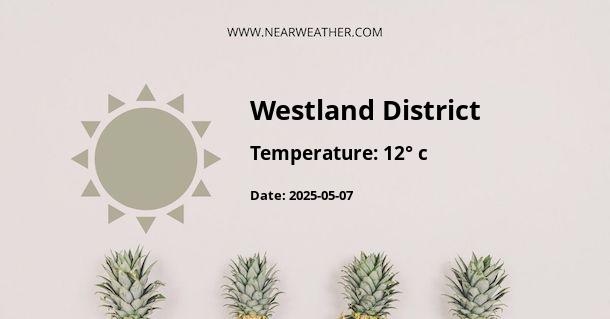Climate and Weather in Westland District, New Zealand
The Westland District, located on the West Coast of the South Island in New Zealand, is known for its stunning natural landscapes, including the Southern Alps, rainforests, glaciers, and rugged coastline. The district experiences a unique climate that is influenced by its proximity to the Tasman Sea and the Southern Alps.
Temperature
The Westland District has a temperate maritime climate, characterized by mild summers and cool winters. The average temperatures vary throughout the year, with January being the warmest month and July being the coldest.
During the summer months of December to February, the average high temperatures range from 20°C to 25°C (68°F to 77°F), while the average low temperatures range from 11°C to 15°C (52°F to 59°F). The coastal areas tend to be slightly warmer than the inland areas due to the moderating influence of the Tasman Sea.
In winter, from June to August, the average high temperatures range from 10°C to 14°C (50°F to 57°F), while the average low temperatures range from 3°C to 7°C (37°F to 45°F). The inland areas and higher elevations in the Southern Alps are typically colder than the coastal areas, and snowfall is common in these regions during winter.
It is important to note that temperatures can vary significantly depending on the specific location within the Westland District and the elevation. Higher elevations and the proximity to the Southern Alps can result in cooler temperatures and more extreme weather conditions.
Rainfall
Westland District is known for its high rainfall, which is primarily due to the prevailing westerly winds that bring moisture-laden air from the Tasman Sea. The district receives a significant amount of rainfall throughout the year, with the wettest months being from May to October.
The annual average rainfall in the Westland District ranges from 3,000 to 7,500 millimeters (118 to 295 inches), making it one of the wettest regions in New Zealand. The coastal areas and the Southern Alps receive the highest amounts of rainfall, with some areas experiencing more than 10,000 millimeters (394 inches) annually.
The rainfall distribution within the district is not uniform, with the coastal areas receiving more rainfall compared to the inland areas. The higher elevations in the Southern Alps also experience more precipitation in the form of snow during winter.
Sunshine Hours
The Westland District receives a moderate amount of sunshine throughout the year, although it is generally lower compared to other parts of New Zealand. The number of sunshine hours varies depending on the season and location within the district.
During the summer months, the Westland District experiences longer daylight hours, with an average of 6 to 8 hours of sunshine per day. In contrast, the winter months have shorter daylight hours, resulting in an average of 2 to 4 hours of sunshine per day.
Wind
The Westland District is known for its strong and gusty winds, especially along the coastline. The prevailing westerly winds, combined with the region's topography, create ideal conditions for wind formation and acceleration.
The average wind speed in the Westland District ranges from 15 to 25 kilometers per hour (9 to 16 miles per hour) throughout the year. However, gusts of over 100 kilometers per hour (62 miles per hour) are not uncommon, particularly during stormy weather or when the Southern Alps act as a barrier to the prevailing winds.
Climate Summary
In summary, the Westland District in New Zealand has a temperate maritime climate characterized by mild summers, cool winters, high rainfall, moderate sunshine hours, and strong winds. The district's unique geography, with its proximity to the Tasman Sea and the Southern Alps, contributes to its distinct climate patterns.
It is advisable to check the weather forecast and be prepared for sudden changes in weather conditions, especially when venturing into the higher elevations and exploring the natural wonders of the Westland District.
| Month | Average High (°C) | Average Low (°C) | Average Rainfall (mm) |
|---|---|---|---|
| January | 20 | 11 | 200-300 |
| February | 22 | 12 | 200-300 |
| March | 20 | 10 | 200-300 |
| April | 17 | 8 | 200-300 |
| May | 14 | 5 | 300-500 |
| June | 12 | 3 | 500-800 |
| July | 11 | 3 | 500-800 |
| August | 12 | 4 | 400-600 |
| September | 14 | 6 | 300-500 |
| October | 16 | 7 | 200-400 |
| November | 18 | 8 | 200-300 |
| December | 19 | 10 | 200-300 |
"The Westland District's climate is heavily influenced by its unique geography, resulting in a temperate maritime climate with high rainfall and strong winds. It is important for visitors to be prepared for changing weather conditions, especially when exploring the district's natural wonders."
Source: Westland District Council
A - Westland District's Latitude is -43.500000 & Longitude is 170.000000.
A - Weather in Westland District is 16° today.
A - Climate Conditions in Westland District shows heavy intensity rain today.
A - Humidity in Westland District is 94% today.
A - Wind speed in Westland District is 6.95 km/h, flowing at 122° wind direction. today.
